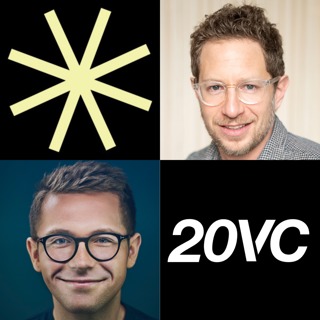
20VC: Investing Lessons from Fred Wilson and Why Small Funds Outperform Large Funds | Why the Secret to Winning in Venture is Splitting Deals |Learnings From the Biggest Hits and Biggest Losses | Why Anyone That Always Does Their Pro-Rata is Wrong with Mo
Mo Koyfman is the Founder and General Partner @ Shine Capital, who announced earlier this year Shine II, a $200M early-stage fund, and Shine Opportunities I, a $100M vehicle. Prior to founding Shine, Mo was the Managing Member @ Moko Brands where he made angel investments in Coinbase, Polychain, Harry's to name a few. Before Moko, Mo spent over 7 years as a General Partner @ Spark Capital where he made investments in Plaid, Warby Parker, Skillshare and Hivemapper, to name a few. Finally prior to Spark, Mo spent over 5 years at IAC where he oversaw group of companies that included Connected Ventures, parent of Vimeo, CollegeHumor & BustedTees. In Today's Episode with Mo Koyfman: 1.) From Entrepreneurial Parents to IAC, Spark Capital and Founding Shine: How did Mo make his way into the world of venture having worked with Dara Khros, Barry Diller and Jeremy Liew? What were some of the biggest takeaways from his time with Barry Diller and IAC? How did Mo's time at Spark impact his investing mindset? What did he learn that he took with him to founding Shine? 2.) Investment Firm vs Investment Partnership: What are the biggest differences between investment firms and investment partnerships? What are the biggest risks founders are taking when they take money from investment firms? Mo has very strong beliefs, how does he manage and inspire debates within his firm without shutting down or intimidating younger, less experienced team members? What does Mo mean when he says, "firms are great but partners matter". 3.) How To Win in Venture: Why does Mo always believe that small funds outperform large funds? What have been some of Mo's biggest lessons from Fred Wilson on fund strategy and sizing? How much of an emphasis does Mo place on the importance of ownership? Why does Mo believe the way to win in venture is to be collaborative? Why does Mo believe in the macro conditions we are entering, the landscape is about to become a lot more collaborative? Why does Mo believe any firm that says they will always do their pro rata is lying? 4.) The Lessons: Success and Failure: What are some of Mo's biggest lessons from his biggest wins, like Plaid at seed? That said, why does Mo believe it is so dangerous to try and learn lessons from the wins? What failures have been most impactful to Mo? What did he take away from them? Why does Mo believe that making great burgers is like building great companies? Items Mentioned in Today's Episode: Mo's Favourite Book: Portnoy's Complaint by Philip Roth
8 Aug 202248min
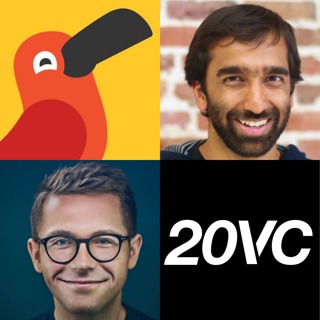
20VC: Raising $60M and Not Touching a Dollar of It; The 3 Decisions That Led to a Cash-Flow Positive Business, Why Not Being Able To Fundraise in the Early Days Can Help Build Your Business & What are the First Things To Break in Scaling Orgs with Sameer
Sameer Shariff is the Co-Founder and CEO @ Cambly, the company that allows you to become fluent faster through one-on-one video chat lessons with native English tutors. To date, Sameer has raised over $60M with Cambly from the best including Jeremy Levine @ Bessemer, Sarah Tavel @ Benchmark, Monashees, YC and more. Prior to founding Cambly, Sameer spent close to 5 years at Google on the Search Quality team and became the Tech Lead of the Search experiments team helping make experimentation a core part of the launch process. In Today's Episode with Sameer Sharif We Discuss: 1.) Entry into Startups and Co-Founding Cambly: How did Sameer make his way into the world of tech with his joining Google straight out of college? What were the 1-2 biggest takeaways from his time at Google? How did it shape his mindset? What was the a-ha moment for Sameer with Cambly? 2.) The Trials and Tribulations of Leadership: What does "high performance" mean to Sameer in business? How has it changed over time? What are the first things to break in a scaling company? How do the best companies retain speed and agility with scale? What are the single biggest hiring mistakes Sameer has made? What did he learn? 3.) The Fundraise that Led to Cash Flow Positive: Why does Sameer think it was so hard to fundraise for Cambly in the early days? When they failed to raise their Series A, what 3-4 core decisions did they make to get Cambly to cash flow positive as fast as possible? How did Sameer communicate their failed fundraising to the team? How did he do this in a way that rallied the troops and did not worry or scare them? What was the tipping point for fundraising to become much much easier for the company? Given they have not touched any of their Series A or Series B funds, how does Sameer think about the balance of growth vs profitability? 4.) Marketplace Dynamics 101: How did Cambly acquire the first 100 customers on the demand side? What is the most challenging dynamic of Cambly; demand or supply side? Where does Sameer see most marketplace founders make the biggest mistakes? What does Sameer know now on the intricacies of marketplace dynamics that he wishes he had known at the beginning? Items Mentioned In Today's Episode with Sameer Shariff: Sameer's Favourite Book: The Most Human Human: What Artificial Intelligence Teaches Us about Being Alive
5 Aug 202235min
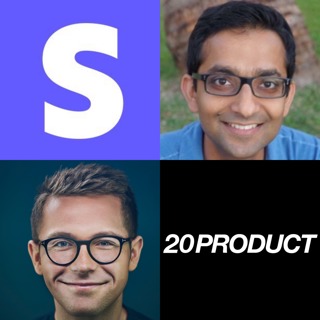
20 Product: Shreyas Doshi on The Three Different Types of Product Leaders and How To Hire Them, The 6 Different Product Metrics You Need To Know and What Good is For Each of Them & Table Stakes Features vs Wow Features; What To Prioritise
Shreyas Doshi is an investor, advisor, and all-around product OG. Most recently Shreyas spent over 5 years at Stripe where he was Stripe's first PM Manager and helped define and grow the Product Management function (from ~5 to more than 50 people). Before Stripe, Shreyas was a Director of Product Management @ Twitter and prior to Twitter spent over 6 years as a Group Product Manager @ Google. Today Shreyas has invested and advises some of the best including advising Airtable, Kalshi, Lendflow, to name a few. In Today's Episode with Shreyas Doshi: 1.) Entry into Product: How did Shreyas make his way into the world of product and product management? Why did Shreyas decide not to do business school when it was the conventional route for everyone going into product management? What were some of Shreyas' biggest takeaways from his time at Stripe and Google? How did they impact his product mind today? 2.) Product Management 101: How does Shreyas define product management today? How do many confuse it? How does Shreyas define product success today? What is the single biggest mistake Shreyas sees founders make when determining the success/PMF of their product? Does Shreyas believe that great product management is science or art? Data or intuition? When should you listen to customers? When should you not? 3.) Metrics 101 & How To Use Them: What is the single biggest mistake Shreyas sees founders make when it comes to selecting their North Star metric? How should founders think about input vs output metrics? What is the difference between the two? What are the 6 types of metrics that all founders and product teams need to focus on? How does their importance change over time? How should the responsibility for these metrics be split between different people and teams? 4.) Three Types of Product Leader: What are the three different types of product leaders? The Craftsperson: What is their core strength? What is their core weakness? How do they interact with the rest of the team and company? The Operator: What is their core strength? What is their core weakness? How do they interact with the rest of the team and company? The Visionary: What is their core strength? What is their core weakness? How do they interact with the rest of the team and company?
3 Aug 202246min
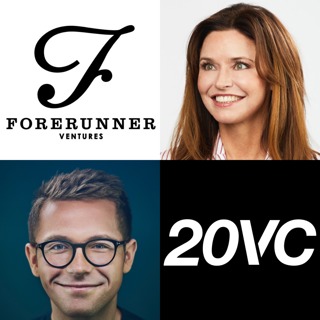
20VC: Forerunner's Kirsten Green on The Biggest Challenges Scaling Both Teams and AUM, What Truly is High Performance in Fund Management & Why Parenting and Relationships are an Enabler To Your Best Work
Kirsten Green is the Founder and Managing Partner @ Forerunner Ventures, one of the leading firms of the last decade investing at the intersection of innovation and culture. As a founder, Kirsten has led efforts to raise over $2B+ from leading institutional investors and invest in more than 100 companies. She currently serves as a board member at Glossier, Ritual, Faire, Hims & Hers, and Curated, to name a few. She has also invested in other smash hits including Chime, Jet, Warby Parker, Hotel Tonight and many more. Due to her immense success, Kirsten has been honored in Time's 100 Most Influential People and named a Top 20 Venture Capitalists by The New York Times in 2018 & 2017. Prior to Forerunner, Kirsten was an equity research analyst and investor at Banc of America Securities. In Today's Episode with Kirsten Green We Discuss: 1.) Entry in Venture at 40 and Founding Forerunner: How did Kirsten make her way into VC at 40 with the founding of Forerunner having never had a role in VC before? What did everyone tell Kirsten when she was looking to break into venture? What did she tell herself when she heard this? What does Kirsten believe she is running from? What does she believe she is running toward? 2.) Fund Management and Leadership: How does Kirsten define high-performance today? What are the nuances of high performance in fund management? How would Kirsten describe her leadership style today? How has it changed over time? What have been some of Kirsten's biggest lessons in terms of what it takes to retain quality with scaling AUM and teams? What have been Kirsten's biggest lessons when it comes to giving hard feedback with kindness? 3.) The Venture Landscape Today and Forerunner's Position: Why does Kirsten believe the venture landscape is more dynamic today than ever? Does Kirsten agree with the statement that venture is less collaborative than ever? Why did Kirsten and Forerunner seem to amend strategy and move into B2B? Why does Kirsten disagree with the delineation between B2C and B2B? 4.) Parenting, Relationships and Life: What have been Kirsten's biggest lessons since becoming a parent? How has it impacted her mindset? Does Kirsten agree that relationships attract from sheer input on work? How does Kirsten separate relationships into two kinds of relationships? What does success in marriage mean for Kirsten? How has she seen that in her own marriage?
1 Aug 202241min
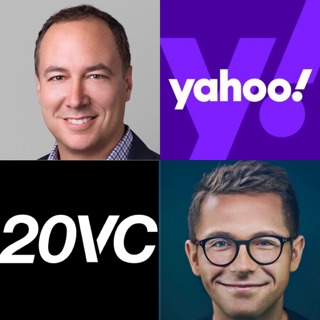
20VC: Yahoo CEO Jim Lanzone on The Yahoo Turnaround Plan; What Needs To Happen | Leadership 101: The 4 Things To Look For When Hiring | Surviving a Crash; Biggest Advice on Cuts, Layoffs, Investor Communications
Jim Lanzone is the CEO @ Yahoo, a company that today reaches nearly 900 million people around the world and is the third largest property on the Internet. Prior to Yahoo, Tim was the CEO of Tinder, the world's most popular app for meeting new people, downloaded by more than 400 million people. Before Tinder, Jim spent a decade as President and CEO of CBS Interactive, a top 10 global Internet company with brands ranging from CBS All Access to CNET. He joined CBS Interactive in 2011 when CBS Corporation purchased Clicker Media, where he was founder and CEO. Before founding Clicker, Jim served as CEO of Ask.com (formerly Ask Jeeves). In Today's Episode with Jim Lanzone 1.) Jim's Entry into the World of Startups: How did Jim go from law school to founding his first tech startup in the dot com boom? How did seeing the crash and the first company going bust, shape Jim's perspectives on great leadership? What does Jim know now that he wishes he had known when he started way back in 1999? 2.) Leadership 101: How does Jim define "high performance" in business today? What are the 4 things Jim always looks for when hiring new people? Why does Jim believe the standard interview process and questions are broken? How does he do it differently? What are his biggest lessons on how to hire effectively? How does Jim know when to let someone go? How long do you give under-performers? 3.) Crashes and Turnarounds: Jim has seen three crashes as a CEO, what are Jim's biggest lessons from 3 prior crashes? How does Jim advise founders to be acting today? What should they focus on? How can leaders maintain morale and optimism in the face of tough macro times? How does Jim advise founders to communicate both with their investors and board when it comes to reduced performance in harder times? 4.) The Yahoo Turnaround: What does Jim believe the 1-2 core things Yahoo needs to fix is? Why are they priorities? How does Jim approach turning round the Yahoo brand? How does he plan to make it attractive? What is the biggest misnomer that people have about Yahoo today? How does Jim think about running a portfolio approach with Yahoo moving forward? How has Jim changed the org structure and management of Yahoo most significantly? Items Mentioned in Today's Episode: Jim's Favourite Book: Team of Rivals: The Political Genius of Abraham Lincoln
29 Juli 202246min
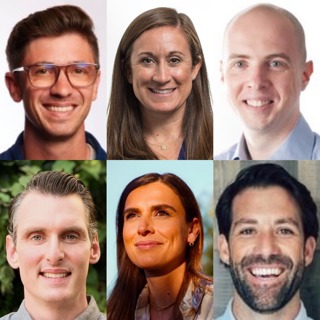
20VC: The Memo: What is a Sales Playbook? Does the Founder Need to Create It? Should the First Sales Hire Be a Leader or a Rep?
Today we deconstruct the canonical question in early-stage sales. Does the founder need to create the sales playbook? Then secondly, if not, should the first sales hires be reps or a sales leader? Today we are joined by 7 of the best sales leaders to share their thoughts. Jordan Van Horn is a Revenue Leader @ Montecarlo. Previously Jordan spent 4 years with Segment and before that spent another 4 years at Dropbox. Oliver Jay (OJ) most recently spent 6 years at Asana where he was hired as the company's first revenue leader. Before Asana, OJ spent 4 years at Dropbox where he scaled the sales team from 0 to 50 while tripling ARR. Dannie Herzberg is a Partner @ Sequoia Capital and previously spent 4 years at Slack as their Head of Enterprise Sales. Before Slack, Dannie spent 5 years at Hubspot building sales, opening an SF office, and then joining product to launch CRM & platform. Zhenya Loginov is the CRO @ Miro, where he runs the go-to-market team of 700+ people across 11 global offices. Prior to Miro, Zhenya was the COO @ Segment. Finally, before Segment, Zhenya led a 100-person team at Dropbox across numerous different functional areas. Kyle Parrish is VP Sales @ Figma, where he has scaled the sales team from 0 to over 100 people in sales. Before Figma, Kyle spent over 5 years at Dropbox in numerous different roles including Head of Sales, where he scaled the Austin, Texas office from 3 to over 80 people. Sam Taylor is the VP of Sales and Customer Success @ Loom, at Loom Sam leads Revenue Org including: Direct Sales, Customer Success, Self-Serve Revenue Growth/Assist. Prior to Loom, Sam spent over 4 years at Salesforce, following their acquisition of Quip, where he was the first sales leader. Before Salesforce and Quip, Sam spent over 3 years at Dropbox as a mid-market sales leader. Jeanne DeWitt Grosser is Head of Americas Revenue & Growth @ Stripe. Pre-Stripe, Jeanne was CRO @ Dialpad and also spent many years at Google in numerous different roles including most recently as Director of GSuite SMB & Mid-Market Sales, North America and LATAM. Mitch Tarica is Head of North America Sales at Zoom Video Communications. Before Zoom, Mitch spent over 5 years at RingCentral and before RingCentral, Mitch was at Oracle for over 7 years in numerous different sales roles. In Today's Discussion on Sales Playbooks We Learn: 1.) What is the right definition for a "sales playbook"? 2.) When is the right time to change your "sales playbook"? 3.) What are the biggest mistakes or misnomers made around the "sales playbook"? 4.) Should the founder be the one to create the first sales playbook or can it be a sales leader? 5.) When is the right time for founders to hire their first sales leaders? 6.) For the first sales hire, should founders hire sales reps or a sales leader? 7.) When should you hire a rep vs a sales leader? What are the nuances?
27 Juli 202232min
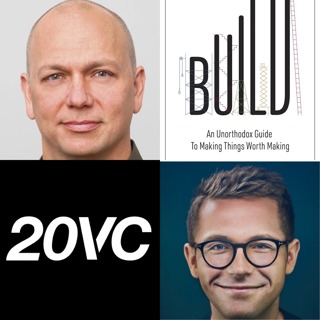
20VC: Tony Fadell on The 3 Hats of Being a CEO, How the Best Leaders Inspire, How to Create Your Own Role within a Company, The Art of Parenting and Teaching Children Resiliency & New York Times' 36 Questions on Love!
Tony Fadell, often referred to as the father of the iPod is one of the leading product thinkers of the last 30 years as one of the makers of some of the most revolutionary products in society from the iPhone and iPod to more recently founding Nest, creating the Nest Thermostat, leading to their $3.2BN acquisition by Google. Tony recently released Build, a masterclass taking 30 years of product and company building lessons and packaging them for you, check it out here. In Today's Episode with Tony Fadell: New York Times' 36 Questions of Love 1.) On reflection, what would Tony most like to change about his childhood? How did moving so much as a child change who Tony was as a person? How can parents instill that same grit and desire in their kids today? What does Tony think is the biggest problem with modern parenting? 2.) As a leader, should the company you are building be a family or a team? What does Tony believe are the 3 hats of being a great CEO? What is the biggest challenge in the transition between hats? Where does Tony see many founders make the biggest mistake? Which hat was Tony strongest with? What was he weakest with? 3.) How to solve the loneliness of being a solo founder? Why does Tony believe that everyone needs a co-founder? Why does Tony not like to invest in teams with a solo founder or more than 4 founders? For Tony, what is the ideal composition of that founding team? How does he test for these skills and traits pre-investing? 4.) How to think differently in the face of adversity? Tony has made bold bets when everyone says he is crazy, how does he not question himself and remain strong in the face of criticism? How does Tony know when to change his mind? When to accept that the bold idea was not right? Is Tony concerned in the face of macro challenges today, investment and commitment to climate change will be cut heavily?
25 Juli 202245min
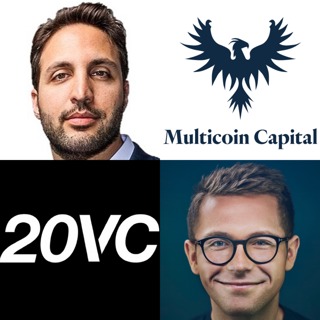
20VC: Why Market Matters So Much More Than Founding Team | Why Crypto Investing is Less Collaborative Than Ever | Why Bitcoin is Not a Hedge Against Inflation | Why Solana Will Beat Ethereum | The Network Effects You Need To Understand with Kyle Samani, C
Kyle Samani is the Co-Founder and Managing Partner @ Multicoin Capital, one of the leading crypto native funds of the last decade with positions in Solana, FTX, Fractal, and Helium to name a few. As for Kyle, before moving to the world of venture and crypto, he founded Pristine, a health IT startup that raised more than $5M in VC, and was acquired by Upskill. In Today's Episode With Kyle Samani We Discuss: 1.) The Founding of Multicoin Capital: How did Kyle make his way from a healthcare startup to founding Multicoin? What was his a-ha moment with the realization of the opportunity we have ahead of us in crypto? What does Kyle know now that he wishes he had known when he started Multicoin? 2.) Crypto Investing in 2022: Why does Kyle believe the crypt investing landscape is less collaborative than ever? What are the biggest challenges of token issuances today? How does the option of liquidity help and hurt Kyle's investor psychology? Is Kyle concerned the volatility in the market will harm institutional investor sentiment for crypto? 3.) Constructing a Crypto Portfolio in 2022: Why does Kyle not believe in temporal diversification? Why does sector-centric company diversification suck? Why are the loss ratios in crypto so much lower than in traditional venture? Why does Kyle believe a no reserves model is optimal in crypto? 4.) Multicoin vs Traditional Venture Firms: Why does Kyle believe that every person over 10 people in a venture firm is a net negative towards the investment decision-making process? What do Kyle and Multicoin do reach the truth together? How do they aggressively use writing and word docs to progress their thoughts? Their discussions are "brutal", how brutal can one be in a discussion on a deal? How does one make team members feel safe but also really push them for the truth and debate? Item's Mentioned in Today's Episode: Kyle's Favourite Recent Reading: Eugene Wei Kyle's Most Recent Investment: Delphia
22 Juli 202240min






















